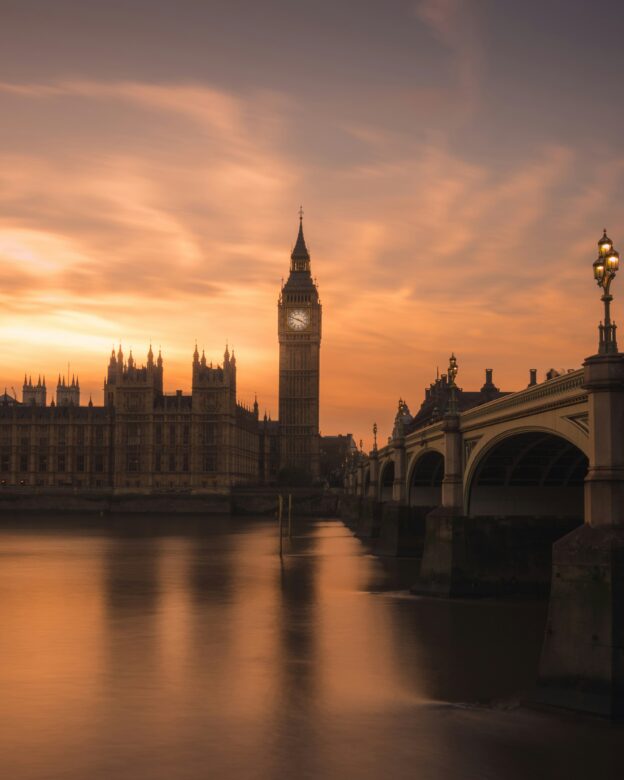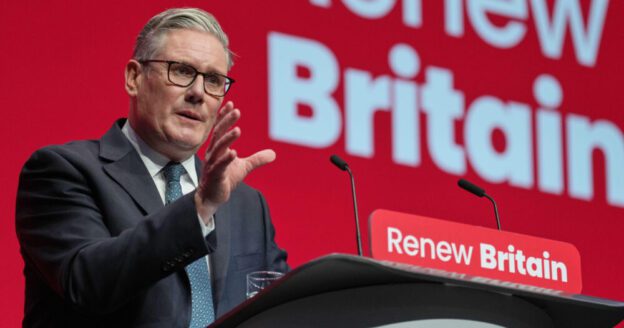Please click on the following link to access GK’s budget briefing: GK Strategy – Autumn Budget 2025


Please click on the following link to access GK’s budget briefing: GK Strategy – Autumn Budget 2025

The government has set itself the ambitious goal for becoming the fastest growing economy in the G7. This lofty ambition sits at the heart of the government’s agenda and is central to its industrial strategy – a 10-year plan to increase business investment in the industries of the future. The drones sector has been identified as a frontier industry, with the government clearing a flightpath for the UK to be a world leader in drone innovation and technologies.
Driving this move is the extraordinary economic potential of drones. A recent PwC report states that the sector could contribute £45 billion to the UK economy and support 650,000 jobs by 2030. Further analysis undertaken by Frazer-Nash consultancy for the government suggests that with public support and a shared strategy and ambition between government and industry, the sector could have contributed £103 billion by 2050. Together, these findings demonstrate how collaboration between government and industry can lead to a thriving drones sector which can drive growth and innovation across the UK.
Regulatory challenges
For this growth to be unlocked, the government must work to address regulatory challenges that constrain innovation. Across government, companies face a range of overlapping rules that can slow commercial deployment and limit investment. One of the largest constraints on the sector is the requirement to keep the drone within the line of sight of the operator. Additional health and safety regulations enforced by the Civil Aviation Authority (CAA) also prohibit drones being flown within a 50m radius of people. This constrains the range of operations drones can perform, limiting their use in many areas such as delivery, infrastructure inspection, and large-scale surveying, particularly in urban areas.
The Health and Safety Executive (HSE) also limits the growth of drones operating in the agricultural sector, with the HSE requiring companies to get approval for almost all aerial spraying. The HSE states that there is a 52-week processing time for drone applications, which will inevitably undermine the innovation and adoption of drones in the agricultural sector.
All these affected areas are where drone technology offers incredible commercial potential, so overcoming these regulatory barriers will be key for businesses looking to unlock growth in the drones sector.
These challenges are not insurmountable and government and industry collaboration is already underway to tackle them. The Regulatory Innovation Office (RIO) is leading a series of pro-innovation reforms for the drones sector, including the introduction of a single, standard risk assessment process to cut approval times for complex drone operations. They are also working on expanding the CAA’s atypical air environment policy, which enables the use of drones Beyond Visual Line of Sight (BVLOS), with the ROI providing £8.9 million in funding for innovative projects that will test the effects of new BVLOS standards. The ROI has also worked with the HSE to make it legal for drones to spray slug pellets, which is a major step forward for agricultural drones businesses.
Public concerns
Drones businesses also face challenges of public perception. The research done by Frazer-Nash consultancy estimated that without public support, the size of the sector will be £65 billion by 2050. That represents a £38 billion reduction in the sector compared to the scenario with public support. Given the incredible economic value that lies in public support, addressing public concerns, such as the use of drones for criminal activities, are of great importance to the sector and government to ensure businesses reach their full potential.
The government is already thinking about innovative solutions to the public perception challenge. In November 2025, the government launched a technology challenge which will encourage industry to develop innovative systems capable of detecting drones designed by criminals to evade current detection methods. If successful, this challenge will help the government intercept drugs being delivered by drones into prisons.
The government’s willingness to cut red tape and find innovative solutions to the challenges facing the sector creates opportunity for the sector. However, it remains essential for companies to engage with the government, both to push further on reducing overly prohibitive regulation and to address public concerns surrounding drone safety. By doing so, businesses can play a central role in shaping a regulatory landscape that supports innovation, builds public trust, and cements the UK’s position as a global leader in drone technology.
If you’d like to discuss drones and the wider political landscape in more detail, please reach out to Jacob on Jacob.walsh@gkstrategy.com

GK’s Thea Southwell Reeves examines how Labour has placed early years at the heart of its social mobility agenda by focusing on high-quality, education-led provision.
Early years is a priority for government and has been since it first entered office last year. High quality early years education is a cornerstone of the equal opportunities ‘mission’ to break the link between a child’s background and their future success. Bridget Phillipson had championed early years long before the election and the appointment of the first ever early years minister was an indication of the priority it would have in the new Department for Education (DfE).
Although several of Labour’s early years policies have continued the work of previous governments, this government’s key ideological shift is away from seeing childcare as simply an economic issue to a focus on the provision of high-quality early education as a driver of social mobility. Addressing regional gaps in childcare provision known as ‘childcare deserts’ is fundamental to this, as is increasing the focus on quality to close the growing disadvantage gap in school readiness.
During its first year, the government’s priority has been implementing the final stages of the funding entitlements roll outs, which were completed this month. Now, eligible working parents of children aged 9 months to 5 years are entitled to 30 hours of funding per week. Overall, the expansion of funding has driven demand for spaces. The government had set a target of creating 85,000 new early years childcare places by September 2025 to support the roll out of funding expansions. It is not yet clear whether this target has been met, butInitial analysis suggests that most of this additional capacity has been concentrated in areas where provision already exists rather than creating new capacity in childcare deserts.
The government’s schools-based nurseries programme is designed to focus new provision in disadvantaged areas with 189 of the 300 government-funded new or expanded in-school settings opening this month. About 10% of school-based nursery provision is delivered by a PVI partnership. The second phase of funding is now open for applications and is prioritising high quality bids from schools in the most disadvantaged communities.
What’s next for early years?
The funding rates to deliver the government-funded childcare have always been contentious, with the industry maintaining that the funding simply does not reflect the true cost of provision. This has led many providers to use additional charges to ‘top up’ their income but the government has pushed back on this, revising the guidance around chargeable extras earlier this year. In its new strategy for the sector, published in July, the DfE announced a full review of early years funding, including the merits of national funding formulae. It will consult on proposals by summer 2026 and businesses should be monitoring and contributing to this process. The strategy also includes plans to increase the funding available to providers to support children with SEND and improve the way funding is allocated as part of the government’s wider reforms to the SEND system. More detail will be set out on this in the schools white paper this autumn.
The early years strategy, for the first time, raises DfE concerns about a rise in large providers backed by private equity. These providers, according to DfE, ‘are less likely to operate in deprived areas…and over time this can result in price rises and disruption to services.’ At the heart of this is a concern about market exits that could destabilise regional childcare provision. Policymakers will continue to monitor the financial sustainability of the early years market and may take further steps to increase market transparency if appropriate. This could include measures like those being taken in adult or children’s social care, such as a financial oversight mechanism. For businesses and investors, monitoring the development of this policy thinking and engaging with the policymaking process is vital to minimising any risk associated with such policy change, as well as realising commercial opportunities.
If you’d like to discuss early years policy in more detail please reach out to Thea on thea@gkstrategy.com

As the party departs Liverpool, still clearly grappling with the challenges of what being the party of government brings, we’ve learned a lot about the direction the party is going. Here are our quick takeaways.
Keir Starmer has shored up his position…for now. With the noise going into this conference all about the leadership challenge from Manchester’s Andy Burnham, the sight of his early departure from conference before the PM’s speech will please No.10. In what could have been a perilous week for the PM, strong reaffirmation of the Chancellor’s fiscal rules, coupled with strong defences from cabinet ministers and aides, resulted in Burnham conceding that Starmer is the “right person for the job”. You can’t help but add the line “for the moment…” with other rising stars like Shabana Mahmood and Wes Streeting clearly biding their time.
Labour is taking the fight to reform. In what was probably his strongest speech as party leader, Starmer clearly set the parameters for British politics. For him, this is about Labour vs Reform. Decency vs division. Ultimately, the class-conscious speech was a deliberate attempt to win back the working class that has increasingly abandoned the party over the years to the likes of Reform. In this more combative approach, he also decried Reform’s policies on immigration as “racist”. A punchy line of attack which worked in the room, but he will hope doesn’t unravel as a perceived attack on all Reform sympathisers who are doubting the centrist parties’ ability to deliver.
The looming budget has not got any easier. In media briefings over the weekend, and in her speech, Rachel Reeves continued the manifesto commitment to not raise taxes on working people. Whilst at the same time, to appease critical voices in the Labour party, she is flirting with the idea of more spending – both on infrastructure and lifting the two-child limit. She said she is a chancellor that wants to invest. None of this sounds like a chancellor staring down the prospect of having to find £30bn in November to plug the gap predicted by the OBR.
The difference a Labour government makes. This has been the underlying strategic narrative of the conference to fend off criticism there is no difference between this government and a Conservative one. We saw speech after speech rattle off long lists of tangible activities the government has taken across the policy spectrum. We can expect much more of this narrative to come, together with a clear focus on ‘showing’ that delivery to the electorate, rather than just ‘telling‘ them.

GK Strategy is pleased to share its guide to effective engagement with policymakers during party conference season.
Insight from the GK team on making the most of party conferences can be accessed here: https://gkstrategy.com/wp-content/uploads/2025/09/Engaging-at-Party-Conference-Season-GK-Strategy-September-2025.pdf

Twelve months ago, the Labour government was elected on a manifesto with housing policy at its heart. It pledged to improve the lives of renters, as well as make housing more affordable by accelerating housebuilding and reforming planning policy, which in turn placed housing policy at the centre of the government’s ‘growth mission’.
One year on from this government taking office, what have been the major trends in housing policy under Labour, and how much progress is it making against the commitments it set out before the election? In this blog, our consultants Sam Tankard, Will Blackman and Joshua Owolabi look at the biggest housing policy initiatives from the government and what to expect next.
Planning and Housebuilding
The root of many troubles facing UK construction and housebuilding lies in the planning system which, in its promise of reform back in 2023, Labour committed to “back the builders not the blockers”. This move was seen as necessary if Labour had any hopes of meeting its manifesto promise to build 1.5 million homes over the course of this parliament. This was always a tall order given the UK has averaged 150,000 new homes between 2013 – 2023, despite targets often still sitting at around 300,000 a year.
The government’s Planning and Infrastructure Bill was introduced earlier this year as one of its flagship pieces of legislation, designed to speed up the delivery of new homes, increase capacity of local planning authorities with new planning officers, unlock land through compulsory purchase orders, and introduce a Nature Restoration Fund to offset environmental impacts.
This was welcomed by developers, investors and pro-housing campaigners as a sign that the government was finally putting in the policy requirements to unlock the level of growth needed to hit their targets, especially as housebuilding ‘starts’ since the beginning of this parliament are sitting at 186,000 – some way off the government’s target.
However, those same supportive voices now feel disappointed that the government has already started to water down the bill, even after removing the whip from an MP for leading a rebellion against it. In its original form, the bill was not considered hugely radical: criticised in part for only making tweaks rather than wholesale change. It does not, for example, even deal with the wider issues hindering development such as zoning and the value of available land, the labour skills shortages in construction, or the rising cost of materials that are pushing up the cost of housebuilding.
Now in the Lords, the government has introduced amendments that would make Environmental Delivery Plans harder and more complicated, as developers will now have to demonstrate how it will contribute positively to nature, and giving Natural England a potential veto on the delivery of new homes.
This significant concession signals the bill could be weakened further still, making it neither effective in delivering the housing at scale, nor enshrining the environmental protections that campaigners want to see. Housing Secretary, Angela Rayner, will need to use her political heft in the Cabinet to demonstrate the government remains on track and isn’t just compromising on a damp squib. After all, as a former prime minister once said, “standing in the middle of the road is very dangerous, you get knocked by the traffic from both sides”.
Rental Reform
One of the most significant areas of housing policy reform over the last 12-months was in fact originated under the last Conservative government. The Renters’ Rights Bill, which is currently coming towards the end of its passage through Parliament, has been a long time in the making.
It was the Theresa May government in 2019 that first consulted on reforms to rebalance the rights and responsibilities of landlord and tenants, which included ending the ability of landlords to issue Section 21 notices, or ‘no-fault’ evictions. This change continues to be the centrepiece of the bill and is intended to give greater stability and security of tenure to tenants. The bill also provides landlords with reformed and expanded grounds for seeking possession of their properties under Section 8 of the Housing Act 1988. This includes cases where the landlord wishes to sell or to move into the property themselves. Other measures include stricter requirements around rent increases, the creation of a new ombudsman, new requirements on landlords to remedy mould and damp problems, and a new right for tenants to request a pet.
The Conservative government’s version of this legislation – then called the Renters’ Reform Bill – fell away following the dissolution of the last parliament. Labour’s version of the legislation includes some significant differences to its predecessor, including increased notice and grace periods, and a three-month requirement of rent arrears before a landlord can seek possession, up from the two months proposed by the Conservatives. Almost all of the changes put forward by Labour are to the benefit of tenants rather than landlords.
Taken together, these reforms are the most significant changes to the regulation of the private rented sector for over 35 years. The residential landlord sector has been careful not to be seen to oppose the legislation outright given the unhelpful optics around this. However, many individual landlords are concerned that the balance has tipped too far away from them, potentially leaving many unable to take back possession of their properties in reasonable circumstances. Court backlogs have provided an additional layer of concern, with delays in processing evictions claims already persisting in many parts of England, and many landlords calling for significant improvements in order to allay their concerns.
Some industry leaders such as Propertymark and the National Residential Landlords Association have warned that the proposed provisions could lead to landlords withdrawing from the sector, in turn limiting supply and driving up rents. The Ministry of Housing, Communities and Local Government’s own impact assessment does not predict an exodus of landlords from the sector. Indeed, landlords have been subject to a raft of regulatory and tax changes since 2015, but these have not resulted in significant divestment from the private rental market, which many had predicted at the time. There is no question that these reforms are significant, but the longer-term impact of them may not be seen for many years to come.
Leasehold Reform
The Leasehold and Freehold Reform Act 2024 (LAFRA 2024) was passed by the previous Conservative government to strengthen leaseholders’ rights. However, its implementation has become the responsibility of the Starmer government as many of the reforms within the act require secondary legislation before they come into effect. This is a significant task given the high number and complexity of the provisions within the act.
In March 2025, the government implemented measures set out in LAFRA 2024 strengthening Right to Manage (RTM) provisions. Prior to March, landlords had been able to recover the costs of dealing with the RTM claim from the RTM company at the end of the process. Now, in a non-contentious claim, the landlord cannot recover any of its costs from the RTM company or the participating leaseholders.
The government is also consulting on the charges leaseholders – and homeowners on freehold estates – pay and the services they receive. One of the most significant challenges for leaseholders under the previous system was the inconsistent format of service charge demands. Once implemented, the new format will require landlords and managing agents to ensure that all demands on leaseholders are consistent, clear, and easy to understand. Any deviation from this prescribed format will render non-payment or late payment provisions in the lease unenforceable, providing a powerful incentive for landlords to comply.
While measures in the LAFRA 2024 will reduce excessive fees for leaseholders, many leaseholders may not fully understand their new rights under the reforms given the complexity of the act. Property agents will need to stay up-to-date with the regulations to guide tenants effectively, especially when it comes to disputes or questions about lease terms. Agents who manage leasehold properties will also need to maintain clear communication with freeholders, ensuring that lease terms comply with the new rules.
Despite the work already undertaken, the government intends to introduce further reforms. The Minister for Housing and Planning, Matthew Pennycook, has long favoured moving away from the leasehold system. As a result, the government has proposed a Leasehold and Commonhold Reform Bill, which will be introduced to parliament before the end of 2025. The bill would aim to make commonhold the default tenure for new flats and allow individual properties within a building or larger development to be owned on a freehold basis.
High quality property managing agents are likely to benefit from the proposed measures. Pennycook has made it clear that agents already play a key role in managing multi-occupancy buildings and freehold estates, and their importance will only increase with the proposed commonhold reforms.
Under the proposed model, agents would be employed by commonhold associations to assist in the day-to-day management of a building, and it is anticipated that almost all new commonhold developments, especially larger or more complex buildings, will be established with a managing agent to help run the site on their behalf. This could drive demand for agents with a strong track record of block management. The government is also considering whether it should be mandatory for a managing agent with appropriate expertise to look after high-risk buildings. Furthermore, the government is consulting on proposals for mandatory qualifications for agents and is highly likely to include measures regulating training and standards for agents in the proposed commonhold bill.
So far, the government made significant progress in enacting its leasehold reform agenda. Despite legal challenges to LAFRA 2024 and opposition from landlords to reforms, Matthew Pennycook and Angela Rayner seem determined to press ahead. Therefore, we can expect major changes to leasehold, commonhold and freehold regulation over the course of this parliament that will present new obstacles and opportunities for the housing sector.